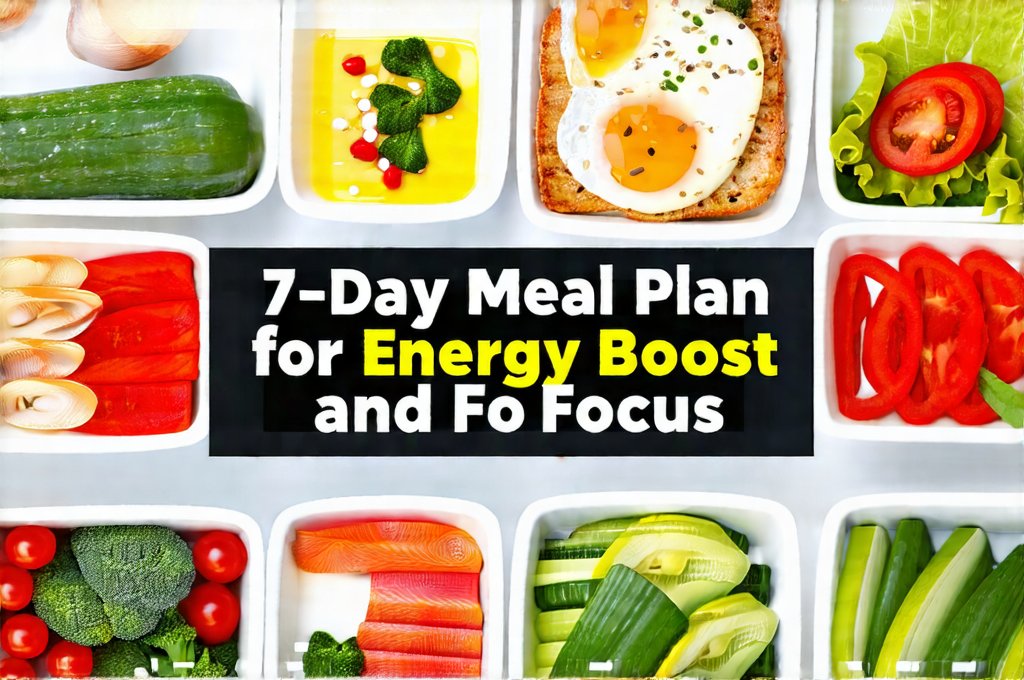Introduction
In today’s fast-paced world, maintaining consistent energy levels and sharp focus can feel like an uphill battle. Many rely on quick fixes – copious amounts of caffeine, sugary snacks, or simply pushing through exhaustion. However, these methods often lead to crashes and ultimately diminish overall well-being. The truth is, sustained energy and mental clarity are deeply connected to what we eat. A thoughtfully designed meal plan isn’t about restrictive dieting; it’s about nourishing your body with the right fuel to thrive. It’s about understanding how different foods impact our brain function, hormone balance, and overall vitality so that we can optimize performance throughout the day.
This 7-day meal plan is built on the principles of balanced nutrition, focusing on whole, unprocessed foods that provide a steady release of energy rather than spikes and dips. It prioritizes complex carbohydrates for sustained fuel, lean protein for focus and repair, healthy fats for brain function, and an abundance of vitamins and minerals to support optimal health. The intention isn’t just to eliminate fatigue but to cultivate long-term energy resilience – the ability to consistently perform at your best, both mentally and physically. This plan is a starting point; feel free to adjust portion sizes and swap ingredients based on your individual needs and preferences, always focusing on maintaining the core principles of balanced nutrition.
The Science Behind Food & Focus
The relationship between food and cognitive function is profound. Our brains are incredibly energy-demanding organs, consuming roughly 20% of our daily caloric intake. What we feed our brain directly impacts its ability to function optimally. Glucose is the primary fuel source for the brain, but not all glucose sources are created equal. Simple sugars provide a quick burst of energy followed by a rapid crash, leaving us feeling sluggish and unfocused. Complex carbohydrates, found in whole grains, fruits, and vegetables, offer a slower, more sustained release of glucose, promoting stable energy levels.
Furthermore, certain nutrients play vital roles in brain health and function. Omega-3 fatty acids, abundant in fish and flaxseeds, are essential for building healthy brain cells and improving cognitive performance. Antioxidants, found in colorful fruits and vegetables, protect the brain from oxidative stress and inflammation. B vitamins are crucial for energy production and nerve function. Protein provides amino acids necessary for neurotransmitter synthesis, impacting mood, focus, and alertness. A diet lacking in these essential nutrients can significantly impair cognitive function and contribute to fatigue.
Finally, gut health is increasingly recognized as playing a significant role in brain health – the ‘gut-brain axis’. A healthy gut microbiome supports nutrient absorption, reduces inflammation, and influences neurotransmitter production. Incorporating probiotic-rich foods like yogurt or kefir and prebiotic-rich foods like onions and garlic can contribute to a healthier gut and improved cognitive function.
Day 1-2: Kickstarting Energy Levels
These first two days focus on establishing a foundation of consistent energy through balanced meals emphasizing complex carbohydrates, lean protein, and healthy fats. The goal is to eliminate sugar cravings and minimize energy fluctuations.
- Breakfast: Oatmeal with berries (blueberries are excellent for brain health) and a sprinkle of nuts/seeds (chia seeds or flaxseeds). Add a scoop of protein powder if desired.
- Lunch: Large salad with grilled chicken or fish, mixed greens, quinoa, avocado, and a light vinaigrette dressing.
- Dinner: Baked salmon with roasted sweet potatoes and steamed broccoli.
- Snacks: Apple slices with almond butter; Greek yogurt with a handful of berries; small portion of trail mix (nuts, seeds, dried fruit).
Hydration is also key – aim for at least eight glasses of water throughout the day. Avoid sugary drinks and limit caffeine intake to one moderate serving in the morning. These initial days are about building momentum and establishing healthy habits. Mindful eating is encouraged; pay attention to your body’s hunger and fullness cues.
Day 3-4: Enhancing Focus & Concentration
As you move into days three and four, we’ll incorporate foods known to specifically support cognitive function. This includes increasing omega-3 intake and prioritizing brain-boosting nutrients.
- Breakfast: Smoothie made with spinach, banana, almond milk, protein powder, and a tablespoon of flaxseed meal.
- Lunch: Turkey breast sandwich on whole-wheat bread with avocado, lettuce, tomato, and a side of carrot sticks.
- Dinner: Lentil soup with a side salad and a slice of whole-grain bread.
- Snacks: Hard-boiled egg; handful of walnuts; small portion of dark chocolate (70% cacao or higher).
Introduce more colorful vegetables into your meals – bell peppers, carrots, spinach, kale – to maximize antioxidant intake. Consider adding turmeric to your cooking for its anti-inflammatory properties. Experiment with different herbs and spices to add flavor and potential health benefits. Active recovery is also beneficial – a short walk during lunch break or some stretching can further enhance focus.
Day 5-7: Sustaining Momentum & Building Resilience
The final three days are about solidifying the habits established earlier in the week and ensuring long-term sustainability. This involves continuing to prioritize whole foods, staying hydrated, and incorporating enjoyable physical activity.
- Breakfast: Whole-wheat toast with avocado and a poached egg.
- Lunch: Leftovers from dinner – this simplifies meal prep and reduces food waste!
- Dinner: Chicken stir-fry with brown rice and plenty of vegetables (broccoli, peppers, onions).
- Snacks: Cottage cheese with pineapple; handful of almonds; small banana.
Reflect on how you’re feeling throughout the week. Are your energy levels more consistent? Is your focus sharper? Identify any challenges you encountered and brainstorm ways to overcome them in the future. Remember that this is a lifestyle change, not a temporary diet. Focus on making sustainable choices that support your overall health and well-being. This includes prioritizing sleep (7-8 hours per night) and managing stress levels through techniques like meditation or yoga.




